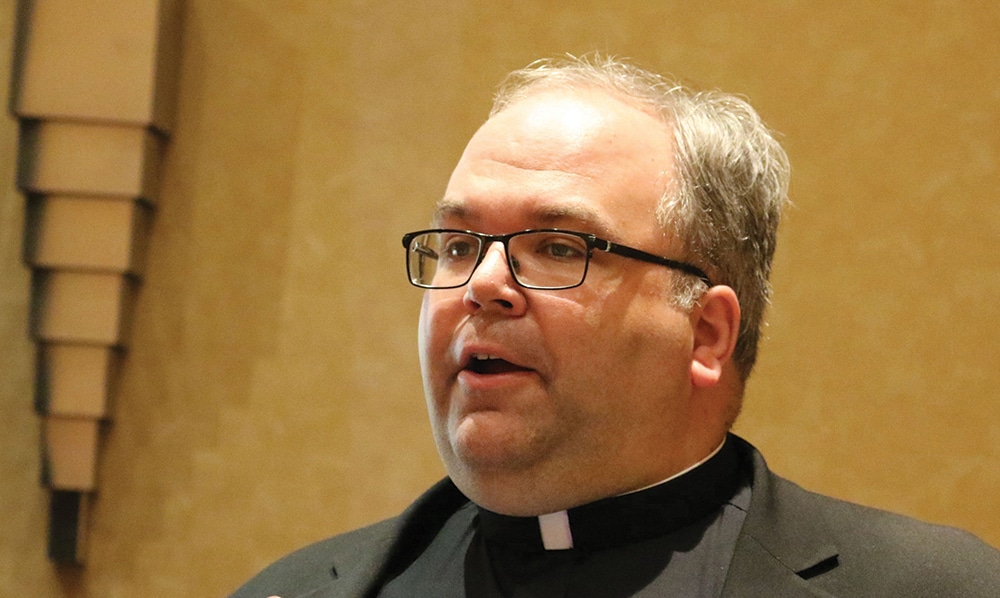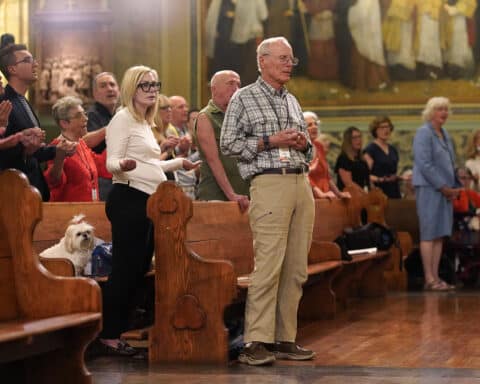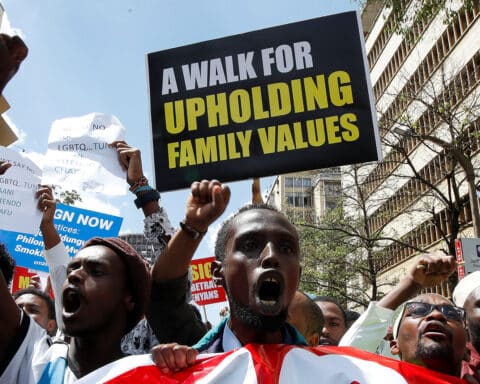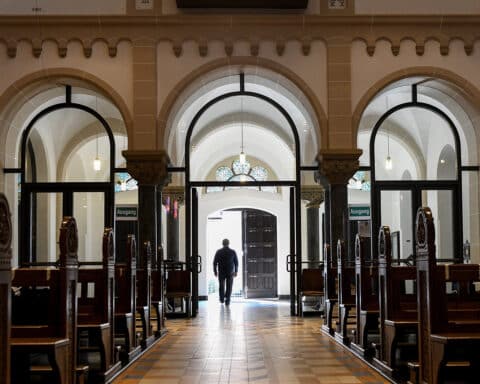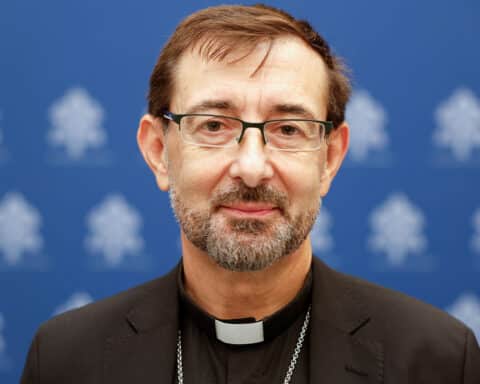Father Philip Bochanski, a priest of the Archdiocese of Philadelphia, has served as the executive director of Courage International since 2017.
Founded by the late Father John Harvey in 1980, Courage seeks to help men and women who are attracted to people of the same-sex live chaste lives in accordance with the Catholic Church’s teachings. Courage has scores of chapters across the United States and in Canada, Australia, Asia, the Carribean, South America and Central America.
In an interview with Our Sunday Visitor, Father Bochanski discussed Courage’s ministry and the often sensitive nature of providing pastoral outreach and care to the LGBTQ community.
Our Sunday Visitor: What is the Courage philosophy of helping someone with same-sex attraction to live chastity?
Father Bochanski: I think it all goes back to our five goals, which were written by our founding members. The first goal is to live chaste lives according to what the Church teaches. What the Church says chastity is, is the integration of sexuality within the big picture of who the person is. It means understanding our desires, where they come from, what we should do about them, and to discern that based on who we are as people created in the image and likeness of God.
The other goals of our apostolate support the first goal. The second goal is developing a life of prayer and dedication. The third goal is to create an atmosphere where everybody can just speak from their experience and share what’s really going on in their lives. The fourth goal is to develop chaste friendships, both inside the group and outside the group, to continue that support that comes from being able to share your walk with other people. The fifth goal is to live a life that serves as a good example to others.
| COURAGE INTERNATIONAL |
|---|
| Courage members are men and women who experience same-sex attractions and who have made a commitment to strive for chastity. They are inspired by the Gospel call to holiness and the Catholic Church’s beautiful teachings about the goodness and inherent purpose of human sexuality. To learn more about Courage, visit couragerc.org. |
Our Sunday Visitor: Is Courage beneficial for someone still exploring questions about their sexual orientation, gender identity, their relationship with the Church and their thoughts on Church teachings?
Father Bochanski: We’ve never really had drop-in meetings. People just don’t show up and ask to join in without knowing anything about the group or the group knowing anything about them. The way that people who are potential members join the group is always through a personal contact with the Courage chaplain who’s appointed in any given diocese. The chaplain sits down with that person at least once, maybe several times, to hear their story, to talk about where they’re coming from, to discern the questions they might have about the Church’s teaching, the doubts or skepticisms they might have, to find out where they are in terms of wanting to strive for chastity.
Sometimes people come to us with a lot of questions and uncertainty, but because they’ve started that conversation with the chaplain, they can continue it one on one with him, and his role then is to find answers to their questions, to make that decision about whether they’re ready to commit to that first goal of striving to live a chaste life.
Our Sunday Visitor: Courage has support groups for family members and loved ones of same-sex attracted members, called Encourage. For parents of young members in particular, what support have they needed?
Father Bochanski: When parents come to us, they used to ask, “How do I fix this situation? What’s the right book, website, video or homily I should give my son or daughter so they can understand what God wants from them, and change everything?” A lot of what we do at first is giving them a place to express their pain, their concerns, their questions, their doubts, their fears — to get that all out in a place where they know everybody understands where they’re coming from, and then to take a step back. The goal here is not to “fix” my son or daughter, to “fix” the situation, but to understand how God is still at work in my life, in the life of our family, in the life of our loved one. What is it in my life that God is asking me to turn over to him in terms of timing, in terms of what I’d like to happen, and how is God going to give me the grace to always be loving and as supportive as I can be to my son or daughter while still speaking the truth in love, as St. Paul says, while sharing with them what I believe God wants for them in their life?
Our Sunday Visitor: How do you strike the balance between being pastoral and welcoming while not compromising or watering down Church teachings on sexual morality?
Father Bochanski: I think what makes it seem difficult is that there are a lot of people in secular society, and even people in the Church it seems, who think that the Church’s teaching about sexual morality, as it relates to same-sex attraction, is inherently harmful or intentionally hateful or hurtful. I think we just have to push back against that and say that everything that God does is out of love for us, and every command that God gives us comes from the fact that he knows us, and he loves us, and he wants what’s best for us.
In terms of pastoral technique, Pope Francis really sets a good path for us when, in an interview about seven years ago, he said, “In life, God accompanies people. And we must accompany them starting from their situation, and accompany them with mercy.”
When someone comes to me to talk about all this, I don’t start quoting the Catechism at them. The first thing I always say is, “Tell me your story.” When you hear where somebody is coming from, what their experience is like for them, when you give them a chance to talk about what they are looking for and whether they’re finding it, then that sets a scene. Having heard someone’s story, then you can share the rest of the story; “This is how God made you, this is God’s plan for you, this is how God is asking you to respond to these things that you’re going through.” It’s very important to start with someone’s actual situation and what they’re actually going through and what they’re actually looking for, and then to propose the Church’s teaching as the answer to what they’re looking for ultimately.
But if you start off by saying, “Look, you’re on the wrong road, you better straighten up and figure this out,” then people walk away. That’s no way to treat a human being who’s going through this difficult thing in their life. What they want is to know that you care about them and then having established that relationship and that trust, then you can share the teaching with them in that context. It makes it much more effective.
Our Sunday Visitor: What is Courage’s approach to the use of “LGBTQ” in this conversation?
Father Bochanski: I tend to speak about a person who experiences same-sex attraction because I think that’s more accurate. I think it’s more respectful, to be frank. It puts the person first and acknowledges that this is part of the person’s experience rather than defining the person in their totality. And it acknowledges that some people experience this differently.
If people want to use that label for themselves, I think it’s fair to follow that up with some sincere questions. First of all, what do you mean by that? We can’t avoid the fact that the secular world uses that label to describe people who basically are identifying this way because their goal is to be in a relationship or that they feel this is who they are, how they’re made and how they want to relate to other people. That might not be what every person means by it, and they may just use it because it’s shorthand and it’s easier than saying, “I’m a person who experiences same-sex attraction.”
But I think if you’re talking to somebody who’s trying to live their faith, part of living the Faith is giving a good example to others. If what they’re saying is, “Yes, I know what the Church teaches, I believe it, I don’t think this is defining who I am, I’m not intending to be in a same-sex relationship, I’m going live a chaste life,” good. Then my question is, “Is using that label going to convey that to other people most of the time?” I think most of the time, at least for people in the secular world, it’s not going to convey that.
Brian Fraga is a contributing editor for Our Sunday Visitor.

